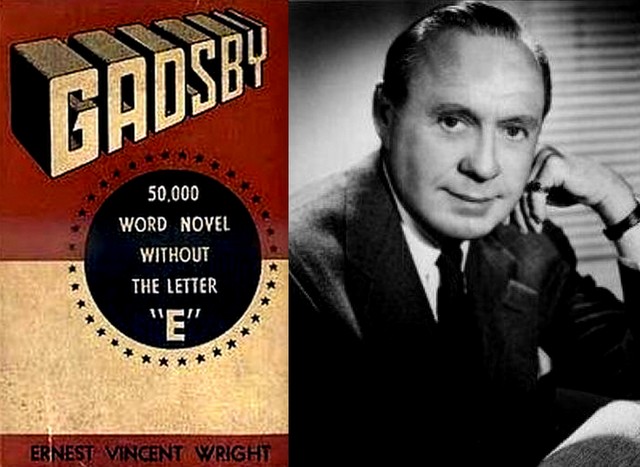Gadsby de E.V. Wright, un lipograma atípico.
Traemos hoy a un escritor americano. Se trata de Ernest Vincent Wright(1872 – 1939), conocido por uno sólo de sus libros Gadsby. Y ¿qué tiene de extraño este libro? Pues que sus , aproximadamente 50.000 palabras no contienen la letra e, se trata pues de un lipograma . Tardó casi 5 meses en escribirlo, con la letra e anulada en la máquina de escribir –¡¡para que no se escapara ninguna involuntariamente!!-. Las mayores dificultades surgieron en los tiempos verbales –el pasado!!-, las abreviaturas y los números –no pudo utilizar ninguna cifra desde el siete hasta el treinta: todas llevan e, en inglés-. Los problemas numéricos surgieron al introducir jóvenes en la novela; también las fechas fueron un problema.

La historia, cuyo protagonista es John Gadsby, transcurr en la primera parte del siglo XX, donde un cincuentón alarmado por por el declive de su ciudad natal, Branton Hills, decide formar una banda de jóvenes para mejorar el nivel de vida y el espíritu cívico. Para los que quieran leerla pueden hacerlo aquí: Gadsby. Y les dejamos con el comienzo del capítulo 1, donde pontifica sobre los comienzos de la niñez y la escuela, ¡¡Y vean que la letra e no aparece por ningún lado!!
If youth, throughout all history, had had a champion to stand up for it; to show a doubting world that a child can think; and, possibly, do it practically; you wouldn’t constantly run across folks today who claim that “a child don’t know anything.” A child’s brain starts functioning at birth; and has, amongst its many infant convolutions, thousands of dormant atoms, into which God has put a mystic possibility for noticing an adult’s act, and figuring out its purport.
Up to about its primary school days a child thinks, naturally, only of play. But many a form of play contains disciplinary factors. “You can’t do this,” or “that puts you out,” shows a child that it must think, practically or fail. Now, if, throughout childhood, a brain has no opposition, it is plain that it will attain a position of “status quo,” as with our ordinary animals. Man knows not why a cow, dog or lion was not born with a brain on a par with ours; why such animals cannot add, subtract, or obtain from books and schooling, that paramount position which Man holds today.
But a human brain is not in that class. Constantly throbbing and pulsating, it rapidly forms opinions; attaining an ability of its own; a fact which is startlingly shown by an occasional child “prodigy” in music or school work. And as, with our dumb animals, a child’s inability convincingly to impart its thoughts to us, should not class it as ignorant…./…
Ernest V. Wright, sin duda un escritor atípico. AMJ
0 comentarios